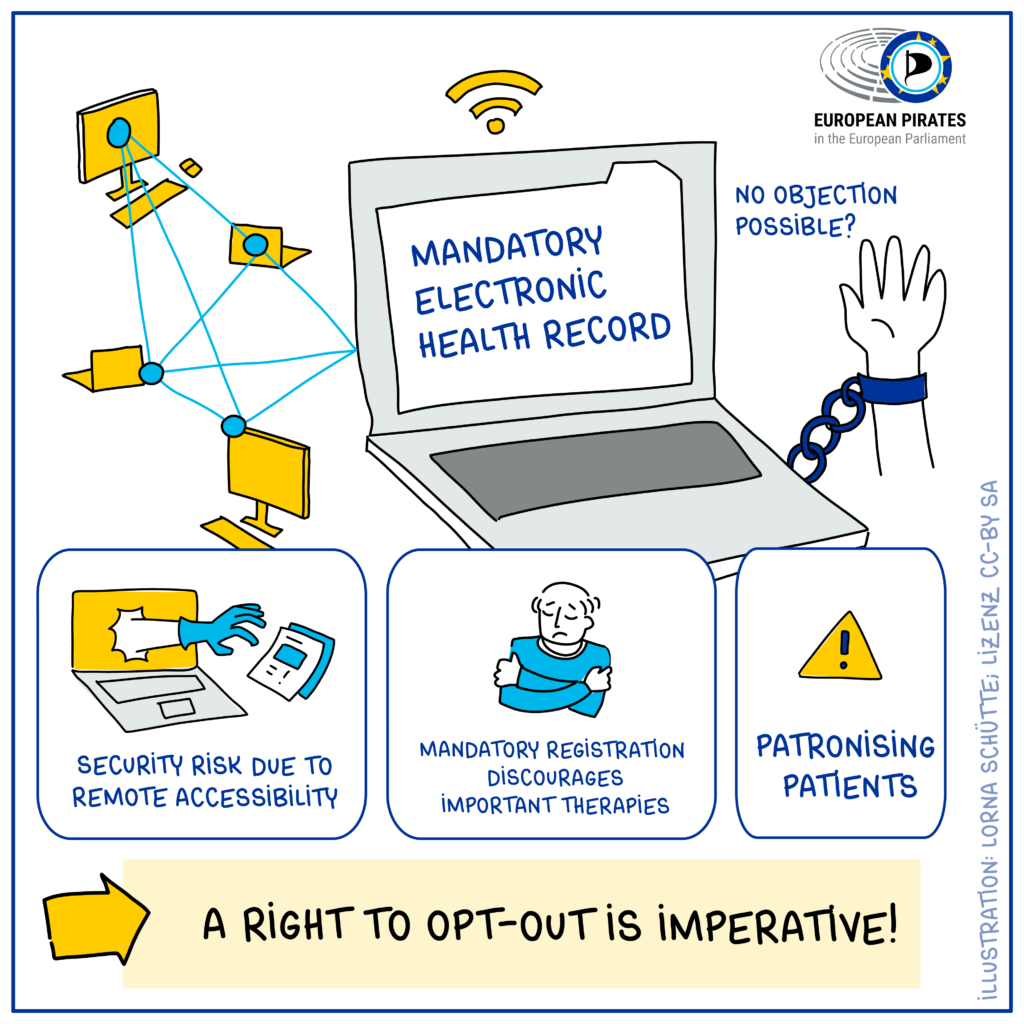European Health Data Space

The EU will create a “European Health Data Space” (EHDS). The proposal aims to connect patients‘ health data across Europe. For example, patients’ medical histories, test results or prescriptions are to be shared with hospitals and doctors treating a patient throughout the EU, unless the patient restricts access. Industry, research and authorities would also be given access to personal health data with only the name removed („pseudonomised“).
Pirates want to stop mandatory interconnected electronic patient files for all

On 13 December 2023, the European Parliament voted in favour of an amendment by MEP Patrick Breyer (Pirate Party) and other MEPs according to which Member States may grant patients a right to object to the collection of all treatments of a person in an EU-wide interconnected electronic patient record. In the negotiations we made sure the final legislation allows for a right to object.
Compulsory electronic patient records must not be introduced due to the risk of hacks and loss of highly sensitive treatment information. A mandatory electronic patient file threatens to deprive patients of control over their health data, and to undermine medical confidentiality.
Pirates call for patients to be asked before their medical records are passed on
Patrick Breyer is calling for patients to be asked for their consent before other doctors and industry access their health data. This is the only way that people with little time, limited language skills or older people will be given a real choice. On 13 December 2023, there was no majority for Breyer’s demand in the European Parliament (202:367 votes), so that the final legislation will contain no requirement to ask patients orally before sharing their data.
“Information revealing my physical and mental health is extremely sensitive. If I can’t rely on this information being treated confidentially by my attending physicians, then I may no longer seek treatment. This puts sick people and their family at risk.
Dr. Patrick Breyer, MEP
My main objectives:
The proposed EU-wide exchange of health data should meet the following requirements:
- Without the free consent of the patient, health records may only be stored locally by the patient‘s trusted doctor and not automatically in interconnected databases, where patients lose control over it. There is a risk that in the event of a loss of interconnected data, the data of the entire population will suddenly be lost. The bill doesn’t even provide for a right to opt-out of the interconnected collection of summaries on all treatments of a patient.
- Only the attending physician should have access to their own health records in the absence of the patient’s free consent. This includes the fact that a person is being treated by a particular doctor in the first place. There are good reasons, for example, to obtain a second opinion without the doctors involved knowing about each other. The Parliament’s and Council’s positions only provide for a right to opt-out.
- If there is ever to be access by industry, by research or even by politics, then only to anonymised and aggregated data. It is not enough to simply remove the names of the patients. After all, treatment histories are so unique making it is easy to reassign them to the person in question. The Parliament’s and Council’s positions only provide for a right to opt-out (except for certain data types such as genetic data).
What happens next?
The final text of the law has been agreed between EU Parliament and EU governments in March 2024. The plenary of the European Parliament gave its final nod to the regulation on 24 April 2024. MEP Patrick Breyer (Pirate Party) participated in the negotiations and opposes the agreement at these terms.
The European Parliament’s negotiators
LIBE (co-lead)
Rapporteur: Annalisa Tardino (ID)
Shadows: ZARZALEJOS Javier (EPP), Petar VITANOV (S&D), Lucia ĎURIŠ NICHOLSONOVÁ (Renew), Patrick BREYER (Greens/EFA), Beata KEMPA (ECR), Konstantinos ARVANITIS (GUE/NGL)
ENVI (co-lead)
Rapporteur: Tomislav SOKOL (EPP)
BUDG (opinion)
Rapporteur: tbc
IMCO (opinion)
Rapporteur: Andrey KOVATCHEV (EPP)
ITRE (opinion)
Rapporteur: Cristian-Silviu BUŞOI (EPP)
Documents
- Legislative Observatory
- Draft Regulation (3 May 2022)
- LIBE/ENVI Draft Report (10 February 2023)
- Our amendments (22 March 2023)
- Excerpt preview of results of the Ipsos opinion poll funded by the Greens/European Free Alliance Group in the European Parliament (May 2023)
- LIBE-ENVI-Report (15 December 2023)
- Our amendments (Part 1, 2)
- 4-column-document (20 December 2023)
Timetable
- 6 December: First Shadows’ meeting
- 11 January 2023: Shadows’ meeting
- 3 February 2023: Deadline for sending draft report (of ENVI and LIBE rapporteurs) to translation
- 1 March 2023: ENVI/LIBE: Presentation of draft report in committee
- 8 March 2023: technical meeting
- 23 March 2023: Deadline for tabling amendments
- Shadows’ Meetings
- 28 November 2023: Vote in ENVI/LIBE Committees of EU Parliament
- 6 December 2023: EU Council adopts their position
- 12 December 2023: Debate in European Parliament
- 13 December 2023: European Parliament vote on its position
- 13 December 2023: First trilogue negotiation
- 30 January 2024: Second trilogue negotiation
- 20 February 2024: Third trilogue negotiation
- 7 March 2024: Fourth trilogue negotiation
- 14 March 2024: Final trilogue negotiation
- 9 April 2024: Vote in ENVI/LIBE Committees of EU Parliament
- 24 April 2024: Adoption of deal by European Parliament
